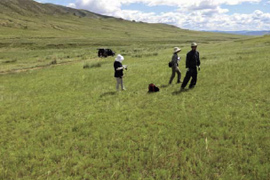The Mitsui & Co. Environment Fund
Introduction to Grant Projects
Toshiya Okuro, Associate Professor, Graduate School of Agricultural and Life Sciences, The University of Tokyo
Development of a restoration manual for the sustainable use of ecosystem services in arid regions of northeast Asia
Research grant
- Project Description
In the steppe regions of northeast Asia, conventional systems of grazing have changed along with progress in market economies and greater demand for livestock products, leading to the rapid degradation of pastures and changes in the biota. To both prevent the destruction of pastoral land and the enable sustainable production, the integration of scientific knowledge for the sustainable use of ecosystems in pastoral area is necessary so that ecological services can be steadily supplied and the functions of ecosystems can be recovered to enable their sustainable management. This research project focuses on the steppe of Mongolia where the prevention of desertification and the sustainable use of ecosystem services have become issues. This study integrates previous ecological knowledge, develops environment restoration techniques to promote the recovery of ecosystem services, creates a "Vulnerability / resilience rating framework" to optimize the selection of methods to apply to each region. We aim to develop and distribute a restoration manual that combines all of these approaches, is versatile and can be easily used by local farmers.
- Fields
- Preservation of surface soil and forestsPreservation of biodiversity and ecosystem
- Grant year
- FY2010 Research Grants
- Grant term
- 3 years
April 2011 - March 2014
- Grant amount
- 29,788,000 yen
- Activity region
- Mongolia

Overview of the Organization

- Representative
- Toshiya Okuro, Associate Professor
- Profile
- Specialist fields
Landscape ecology, conservation of green spaces
Affiliated academic societies
Japanese Institute of Landscape Architecture, Association for Rural Planning, The Ecological Society of Japan, The Society of Vegetation Science, Center for Environmental Information Science
Background
Completed master's degree at the Graduate School of Agricultural and Life Sciences, the University of Tokyo, 1990; Researcher, National Institute for Agro-Environmental Sciences, 1990; Chief Researcher, National Institute for Agro-Environmental Sciences, 1998; Visiting Professor, Naman Desertification Research Station, Cold and Arid Regions Environmental and Engineering Research Institute, Chinese Academy of Sciences, 1999; Visiting Researcher, Center for Development Research, Bonn University, 2004; Current position from 2006. Position: Professor of Agriculture (the University of Tokyo, 1998) - WEB site
- http://www.es.a.u-tokyo.ac.jp/lep/wiki.cgi?page=FrontPage
- Collaborators
- Tomoo Okayasu, Associate Professor, Graduate School of Agricultural and Life Sciences, The University of Tokyo; Ken Yoshikawa, Professor, Graduate School of Environmental Science, Okayama University; Yuu Yoshihara, Professor, Graduate School of Agricultural Science, Tohoku University; Undarmaa Jamsran, Associate Professor, Ecological Research Center, Mongolian State University of Agriculture
- Research record
-
- (1) Okayasu, T., Okuro, T., Undarmaa, J., Takeuchi, K. (2011) Threshold distinctions between equilibrium and non-equilibrium pastoral systems along a continuous climatic gradient. Rangeland Ecology and Management 64, 10-17.
- (2) Okuro, T. (2010) Current status of desertifi cation issues with special reference to sustainable provision of ecosystem services in Northeast Asia. Global Environmental Research 14, 3-10.
- (3) Yoshihara, Y., Okuro, T., Buuveibaatar, B., Undarmaa, J. and Takeuchi, K. (2010) Spatial pattern of grazing affects influence of herbivores on spatial heterogeneity of plants and soils. Oecologia 162, 427-434.
- (4) Sasaki, T., Yoshihara, Y., Jamsran, U. and Okuro, T. (2010) Ecological stoichiometry explains larger scale facilitation processes. Ecological Engineering 36, 1070-1075.
- (5) Hiroshi KOIZUMI, Toshiya OKURO, Mariko SHIGERU (2000), Sougen Sabaku no Seitai (Ecology of grassland and desert), Kyoritsu Shuppan, 250 pp.